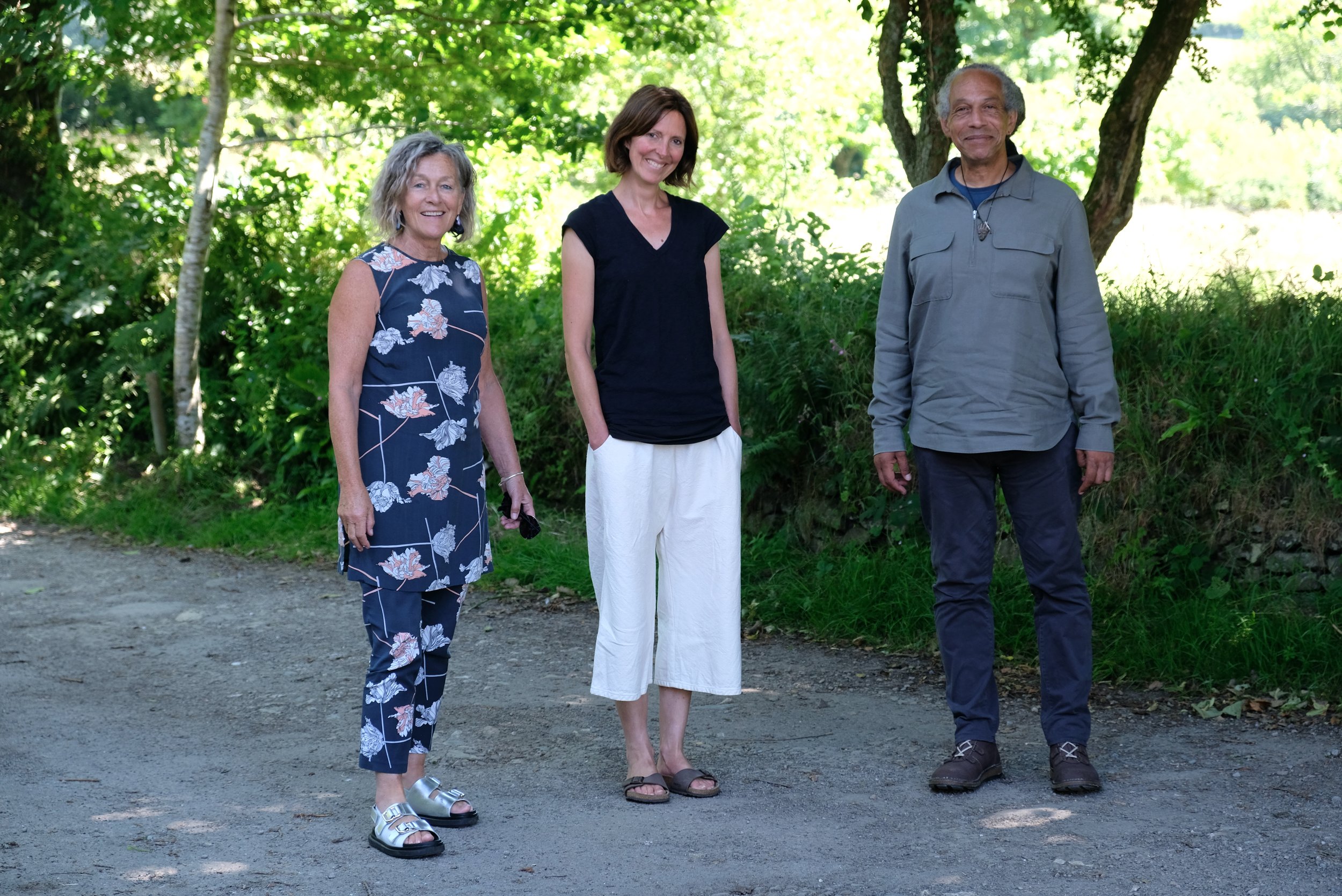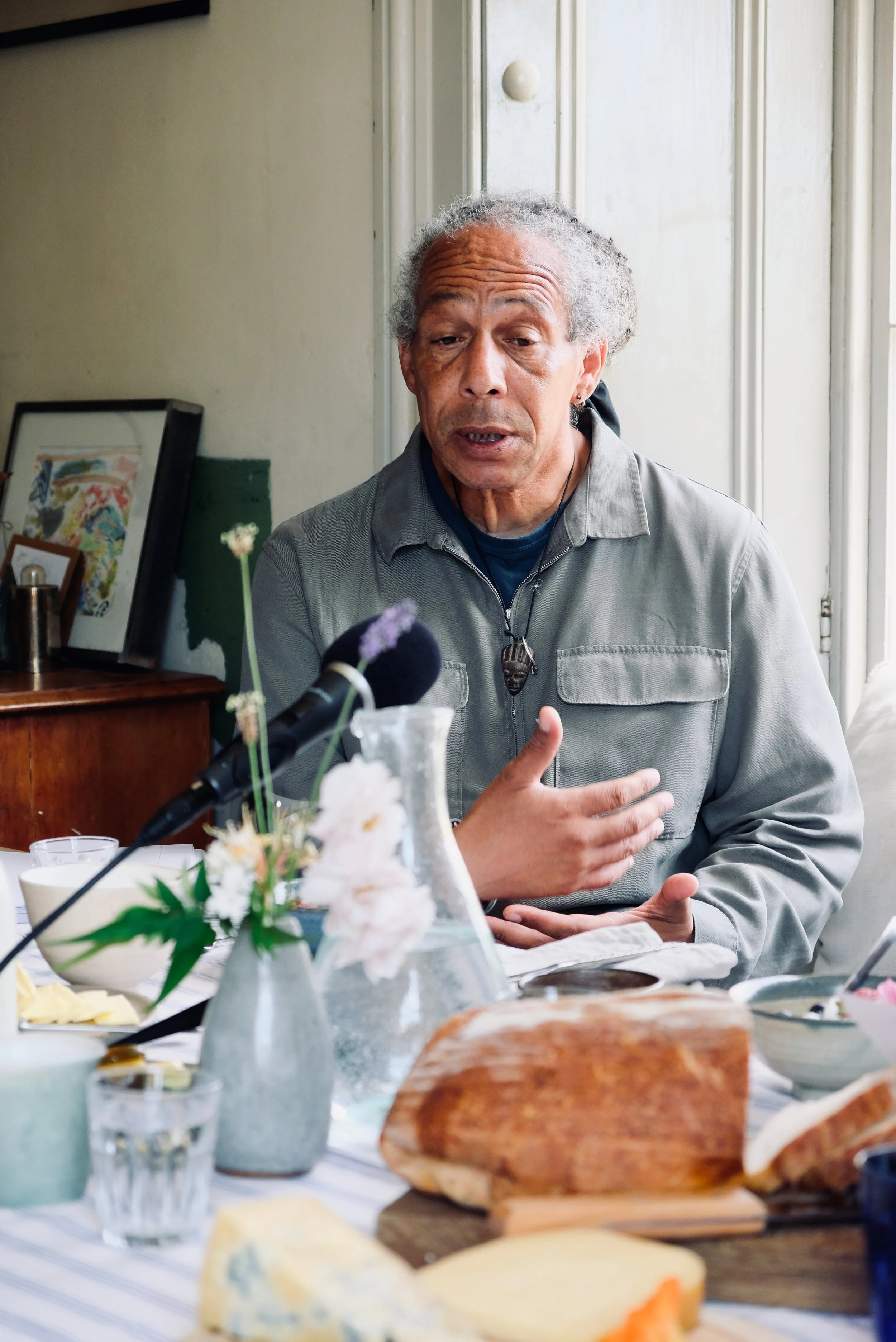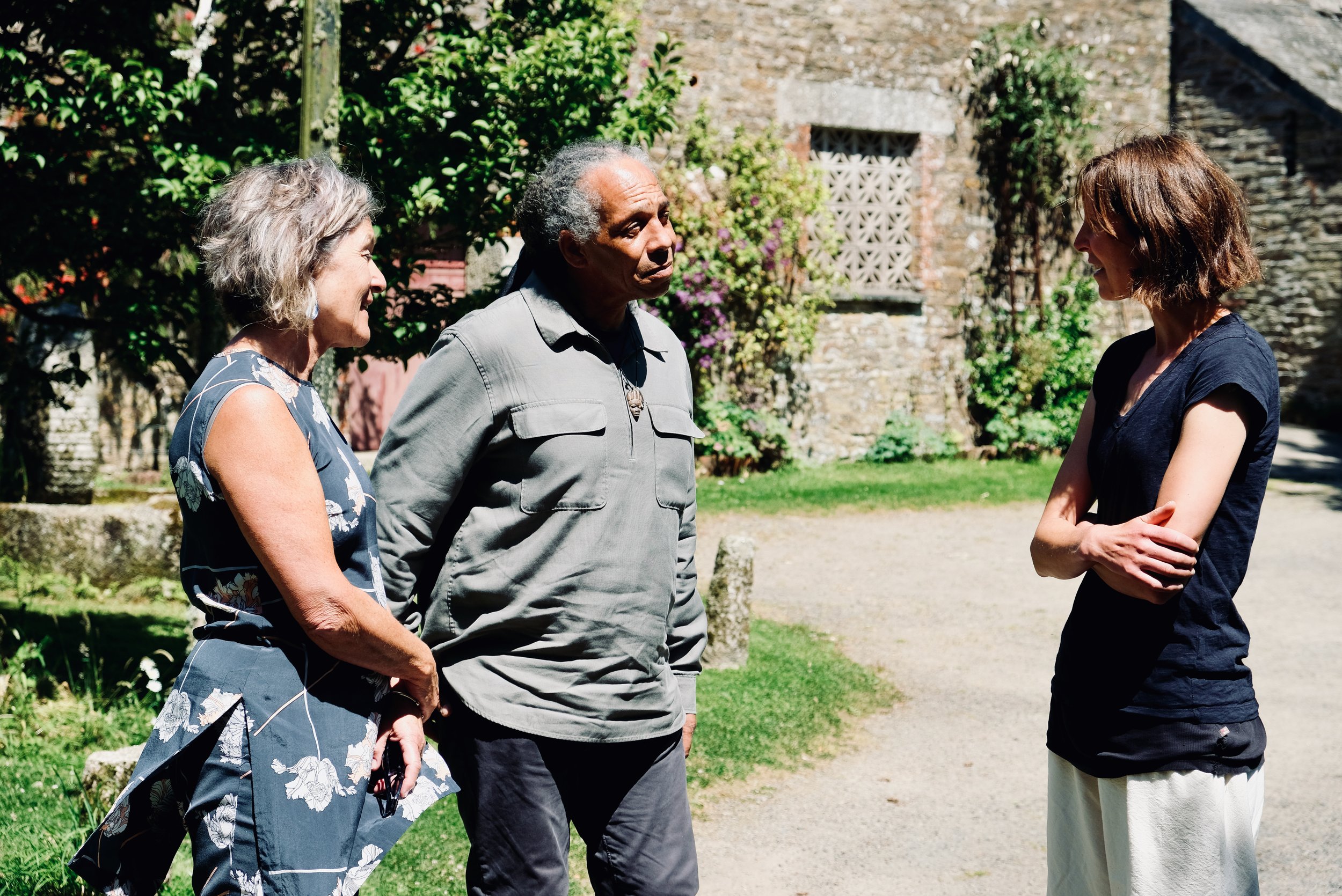Breakfast & Beyond - Episode 15:
Sustaining our mental health with Catherine Collin & Dean Harvey
For Episode 15 I was joined by two guests, Catherine Collin and Dean Harvey, both experts in the field of mental health in Cornwall. You may be wondering, why an episode on mental health, in a podcast focused on sustainable living?
‘Sustainability’ as a concept is often broken down into four interlinked areas: environmental, social, economic and political. Mental health could be categorised as a strand of ‘social sustainability’, pertaining to our wellbeing and opportunity to lead happy, prosperous lives - which in turn affects our economic prospects, our ability to play an active part in our communities, and it potentially affects our capacity to contribute to the environmental sustainability agenda.
The World Health Organisation states “there can be no health or sustainable development without mental health”. Yet mental health – and illness – is a major issue that impacts all of us – whether directly, or through supporting someone within our social circle. It’s estimated that 1 in every 8 people in the world live with a mental disorder (WHO). This felt to me, therefore, like a topic that needs to be front and centre in any discussion of sustainable development, not least as it’s a theme that historically has stigma and shame attached to it, which only serves to heighten the problem.
So back to my guests …
Catherine practices as a clinical psychologist in the NHS, as well as being an Academic Director for the clinical psychology doctorate at Plymouth University, a Director of the organisation Compassionate Mental Health, and she has clocked up many years delivering primary care psychological therapy services.
Dean is a Community Development Worker for the Cornwall-based charity Pentreath, which aims to promote mental health through personal development, education and employment – and Dean specialises in delivering courses aimed at supporting and promoting mental health within marginalised communities, as well as recently being appointed as a non-executive director to the Cornwall Partnership NHS Foundation Trust, with a focus on strengthening inclusion and diversity.
Our conversation covers themes ranging from how we define mental health and mental illness, to the specific context within Cornwall; the extent to which stigma is still prevalent; how our mental health is affected by social inequalities and our unique life circumstances; and we also talk about suicide – an area in which both Dean and Catherine specialise – so I wanted to let you know that this episode includes discussions on suicide that might be upsetting to some people.
“To have suicidal thoughts is quite common; it’s part of the human experience.
If we are able to talk to each other, disrupt these thoughts, talk them through, we are saving so many people.
We have the power of talking […] we are sustainable when we work together.” (Dean)
The insights that Catherine and Dean share are thoughtful, considered and compassionate, and given that all of us are, have been, or are likely to be, affected by mental health issues at some point in our lives, I hope that this conversation proves to be as valuable for you as it was for me …
Welcome to Episode 15 of Breakfast & Beyond .. listen via Apple Podcasts, Spotify, Stitcher & Tune-In
Breakfast: recipes, producers & growers …
Oat & Buckwheat Granola (see recipe - which I adapted to use 50 / 50 oats and buckwheat groats)
Gooseberry & Pineapple Weed Muffins (see recipe)
Blueberries from the gardens here at Botelet Farm
Sourdough, raspberries, strawberries, Cornish Gouda, Yarg and Cornish Blue sourced via Colwith Farm Shop
Yoghurt and butter from Trewithen Dairy
Tomatoes and cucumber from the Real Food Garden
Milk from Green Cow Dairy
Tamar Valley honey, sourced via Green Cow Dairy
Freda’s peanut butter, sourced via Colwith
Strawberry jam by Boddington’s Berries
Coffee by Lars & Margo
Sustainable living issue: mental health
There is increasing acknowledgement that mental health is fundamental to sustainable development, and that it is a serious issue that needs to be more readily addressed; worldwide, more than two thirds of people with mental health conditions don’t get the care they need (Forbes).
A UK Government All-Party Governmental Group (APPG) Report states ‘mental illnesses cause more disability than any other health condition; bring enormous pain and suffering to individuals and their families and communities; and can lead to early death, human rights abuses and damage to the economy’ along with acknowledging that mental health is generally given a very low priority or is entirely neglected in national and international development policies. The same report highlights that ‘mental health problems account for almost 13% of the world’s total disease burden’ which has implications for all areas of life - health and wellbeing, education prospects, economic prosperity, ability to actively contribute within ones communities, and more.
It’s important to recognise - as Dean and Catherine discuss during our conversation - that experiences of mental health issues vary across different groups and communities. The charity Mind has a useful article on this, explaining that ‘cultural context affects how communities talk about mental health. This context will affect how members of the community access services’ and therefore that different approaches to supporting mental health are required.
Looking at Cornwall in particular, people within the county are united by their residence within a specific geographic area, but it’s important to remember that there are many social and economic inequalities within this. Rurality, deprivation (some of Cornwall’s neighbourhoods rank among the most deprived in the UK, and indeed in Northern Europe) and an ageing population are some of the factors that contribute to comparatively high rates of mental health conditions and suicide (Cornwall Live).
Mental health is clearly an issue that needs to be prioritised within sustainable development conversations strategies all all levels, from the local to the global.
Words to action: what can we do?
Take care of our own mental health. This may be prioritising small daily steps that we know contribute to our sense of wellbeing, whether getting out in nature, spending time with family or friends, or practices such as meditation or yoga. But also seek help when if you feel that you need it - you may wish to start by talking to someone you trust such as a family member or friend, visiting your GP or contact a support organisation (see example in next section below). Know that there is help available if you need it.
Look out for those around us. If you think that someone within your social circle is struggling with their mental health, reach out and offer to support them. This NHS article discusses ways in which you can helpfully offer support.
You may wish to get involved with organisations that support mental health, there are many charities that rely on help from volunteers for all sorts of activities depending on your skillset and availability. See below for some suggestions.
Social media can have many benefits in terms of providing a sense of community and breaking down barriers to talking about topics such as mental health, but they can also exacerbate mental health issues for example by presenting an unrealistic expectation about how we should be leading our lives. Be alert to the impact of social media on ourselves and others, especially young people. This article by Young Minds discusses how to create health habits around social media use.
Engage in compassionate conversations around mental health. Talking about mental health helps to break down taboos and stigma, so be part of the change that sees us becoming more open and less judgemental culturally about mental health. Acknowledging and seeking to understand the nuances in terms of how mental health issues can manifest for different people can help to make our conversations more compassionate. We are our communities; if we want our communities to be open and supportive in regards to mental health, we can be part of making the change.
Show your support for engaging with mental health awareness within any settings such as work or education that you are connected to. This might be suggesting or backing considered initiatives to support mental health.
Consider writing to your MP about the issue of mental health - contact your MP setting out your concerns, and actions you would like to see happen.
Remember: small individual steps do, collectively, make a difference. Talk about the issue of mental health and illness with those around you. We are all influencers within our own social networks, from our personal relationships to within the institutions we connect with such as work place, healthcare and education settings.
Resources & links …
To seek help for a mental health issue for yourself or someone you know, consider the following (from an article by Mind):
Contacting your GP
Contacting a mental health charity such as Mind
Contacting a trained therapist
Talking to friends, family, carers or neighbours.
For urgent help, you can:
Call 999
Present at A&E
Contact your local Crisis Team
Call The Samaritans if you’re struggling to cope and need someone to listen without judgement or pressure.
For Cornwall Council’s information about how to access mental health support within the County, see this link.
There are many Cornwall-based third-sector organisations that focus on supporting mental health, including:
Clear · Invictus Trust · Mind Cornwall · Man Down · Pentreath · Re-Gain · Sea Sanctuary · Your Voice Cornwall
Sustainable Development Goals
The UN’s Sustainable Development Goals (SDGs) are 17 targets representing a universal call to action to end poverty, protect the planet and ensure that all people enjoy peace and prosperity by 2030. ‘Everyone is needed to reach these ambitious targets. The creativity, knowhow, technology and financial resources from all of society is necessary to achieve the SDGs in every context’ (UNDP). Translating these global objectives to tease out their relevance at the individual and small-organisational scale can inspire us to connect with these important global themes and consider what we are doing - and what more we can do - to make a contribution that supports our own work and wellbeing along with benefiting other people and the planet.
In Episode 15 our discussion referenced the following Sustainable Development Goals:
3 - Good Health & Wellbeing - mental health is a fundamental aspect of our general health and wellbeing.
8 - Decent Work & Economic Growth - mental health is important for us to be able to prosper economically, as individuals and societally. Dean’s work through the charity Pentreath focuses on promoting good mental health through personal development, education and employment.
10 - Reduced Inequalities - by addressing inequalities within mental health (for example looking at cultural and economic barriers to accessing support and services) there are implications for reducing broader inequalities that create barriers for people which ultimately hold back their chance of prospering.
11 - Sustainable Cities and Communities - the mental health of a community is fundamental to its opportunities for sustainable development. As discussed by Catherine and Dean, communities (both formal and informal) also hold huge potential to support and improve the mental health of the people within them.
Podcast recording: behind the scenes …
Thank you for listening!
Thank you for listening to Breakfast & Beyond: Conversations from Cornwall on Sustainable Living. If you enjoyed listening I’d love it if you could subscribe to the podcast, rate it, and share episodes with friends and family who would enjoy them. You can listen and subscribe via Apple Podcasts, Spotify, Tune-In or wherever you find your podcasts.
I’d love to know your thoughts - please join the conversation and get in touch by email tia@botelet.com or instagram. Thank you and I look forward to sharing next month’s episode with you.
The Breakfast & Beyond podcast is hosted at our home Botelet Farm in South East Cornwall, where my husband’s family have lived and farmed for over 150 years, and three generations still share the farmhouse today. Set in a peaceful valley upstream of Fowey, we welcome visitors to stay in historic cottages, and there’s a yurt for those who love to immerse themselves in nature.














